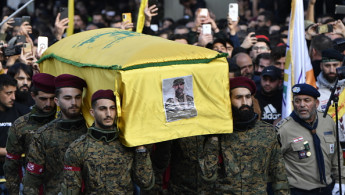Top Hezbollah commander may have been killed in bomb attack, not drone strike: report
A top Hezbollah commander assassinated in southern Lebanon may have been killed by an explosive device planted near his house and not a drone strike, an Israeli newspaper has reported, as Hezbollah has warned of espionage tactics.
Wissam Tawil was thought to have been killed when his car was struck by a bomb from an Israeli drone in the village of Khirbet Selm, around 15 km from the Lebanon-Israel border, at the start of this week.
A senior commander of Hezbollah's elite Radwan Force, Tawil's killing marked the loss of the most senior Hezbollah official since the beginning of cross-border clashes between the powerful Iran-backed group and Israel on October 8.
But in a report on Wednesday, Hebrew-language daily Maariv said Tawil may have been killed by an explosive device detonated by a drone, or with another type of device that could have been automatically detonated.
Lebanon’s Al-Akhbar newspaper said Maariv’s report on Tawil being killed by a bomb placed near his residence instead of an airstrike came to "convey the message that not only are Hamas leaders in Beirut exposed to being targeted, but so is Hezbollah’s leadership in southern Lebanon."
An Israeli drone attack earlier this month killed senior Hamas leader Saleh al-Arouri in the Dahieh south of Beirut.
The assassination of Arouri and two other members of Hamas, as well as Tawil, were significant developments in the three-month old war in Gaza and Lebanon’s frontier with Israel.
Arouri’s killing was the first Israeli attack on the Lebanese capital since October 8, and Tawil’s killing was seen as a heavy blow to Hezbollah.
Fears of spies and saboteurs
Both assassinations, which took place only days apart, raised concerns of a full-blown war erupting between Israel and Hezbollah, and Tel Aviv acting on previous threats that it will target Hamas commanders wherever they may be.
It has also raised questions about possible collaborators providing Israel with intelligence, or tactics Israel has resorted to to gather information.
Hezbollah on Wednesday released a statement warning people in south Lebanon – particularly those from villages caught in the crossfire near the border – against "Israeli tricks" to collect information about the armed group.
While both sides are loath to make any concessions that could be perceived as weakness, neither want another large-scale, costly war
— The New Arab (@The_NewArab) December 18, 2023
Is all-out war between Israel and Hezbollah on the horizon? ⬇️https://t.co/glbEWKrp6o
"The Israeli enemy continues to search for alternatives to collect information about the resistance and the whereabouts of its fighters in the villages of the south," the statement said, "especially after it largely lost the effectiveness of eavesdropping and spying devices installed along the border, after they [transmission towers] were destroyed by the resistance."
The statement went on to say that Israelis contact people in south Lebanon using Lebanese phone numbers and a Lebanese dialect, with the aim of inquiring about some individuals and their whereabouts.
"The enemy impersonates multiple people," Hezbollah said, pretending to be from different Lebanese security agencies, or relief agencies providing aid, among others, and uses this "information to verify the presence of our brothers in homes it intends to target."
It asked civilians to "end these calls immediately and inform relevant authorities without delay."
US seeks 'diplomatic solution'
Senior White House advisor Amos Hochstein said Thursday both Lebanon and Israel "prefer" a diplomatic deal to end the border hostilities.
"We need to find a diplomatic solution that will allow for the Lebanese people to return to their homes in south Lebanon... as the people of Israel need to be able to return to their homes in their north," Hochstein told reporters in the Lebanese capital.
After a visit to Israel, Hochstein on Thursday met Lebanon’s parliament speaker, caretaker prime minister and army chief in Beirut, amid growing fears that Israel’s war on Gaza could escalate into a regional conflagration.
"We're living in a crisis moment where we would like to see a diplomatic solution and I believe that both sides prefer a diplomatic solution," the US envoy said, adding: "It's our job to get one".
Playing a mediator role in the 2022 deal that saw Lebanon and Israel demarcate their maritime boundaries, Hochstein has also been tasked with mediating negotiations between the enemy states to reach an agreement on solidifying their land border.





 Follow the Middle East's top stories in English at The New Arab on Google News
Follow the Middle East's top stories in English at The New Arab on Google News
![MP Essam Diab's pursuit to block TikTok in Egypt has revived an already ongoing debate in the country. [Getty]](/sites/default/files/styles/image_330x185/public/1230748046.jpeg?h=a5f2f23a&itok=-8MqBLLC)

